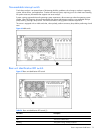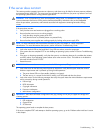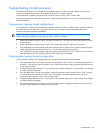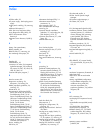
Troubleshooting 82
Troubleshooting a failed processor
The AMD HyperTransport™ link architecture links multiple processors. When a processor failure occurs, the root
cause of the problem can be either a failed HyperTransport link or a failed processor.
A failed processor or failed HyperTransport link causes the system to hang at POST without video.
Perform the steps outlined in the following sections to isolate a failed component in a two- or four-processor memory
board configuration.
Two-processor memory board configuration
In a two-processor memory board configuration, processor memory boards are installed in slot 1 and slot 2. Because
the system does not boot with only one processor board, one or two extra, known good boards (along with
processors) might be required to troubleshoot.
IMPORTANT: Be sure that the processor memory board in slot 2 has DIMMs installed. For more information on
memory population guidelines, see the “Memory options” section in Chapter 2.
1. Reseat both processor memory boards, and power up the server. If this does not resolve the problem, proceed
to the next step.
2. Replace the processor memory board in slot 2 with a known good board, and power up the server.
3. If the problem has not been resolved, replace the processor memory board in slot 2 with the original processor
board, and replace the processor board in slot 1 with the known good processor board.
4. If the problem has not been resolved, replace the original processor boards in slot 1 and slot 2 with two known
good processor boards. If the system still fails to boot, replace the system board.
Four-processor memory board configuration
In a four-processor memory board configuration, all processor memory board slots are populated.
1. If the system fails to boot, remove the processor memory boards in slot 3 and slot 4 to attempt booting with two
processors. If this action corrects the problem, one or both of the processor memory boards removed from slots
3 and 4 might be bad.
2. Complete the steps described in the “Two-processor memory board configuration” section earlier in this chapter
to isolate the failed components.
3. If this procedure does not resolve the problem, replace the processor memory boards in slots 1 and 2 with the
two boards that were removed from slots 3 and 4. If the problem has been resolved, one or both of the
processor boards originally in slots 1 and 2 might be bad.
4. Complete the steps described in the “Two-processor memory board configuration” section earlier in this chapter
to isolate the failed components.
5. If all processor boards work, run two at a time. If the four-processor configuration still does not work, a link on
the system board might be bad. Replace the system board.


















